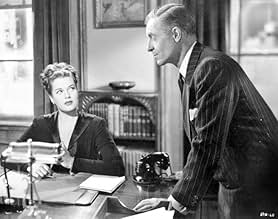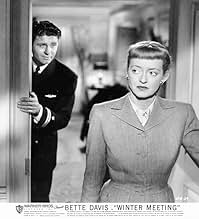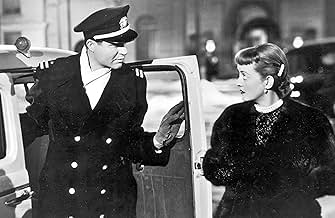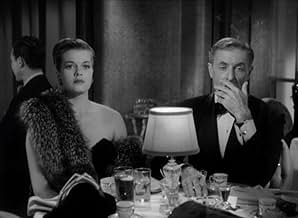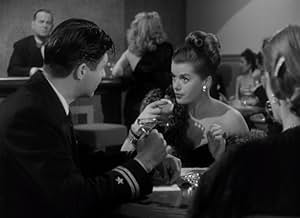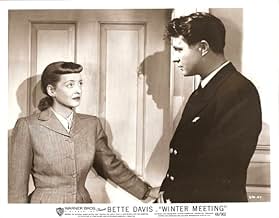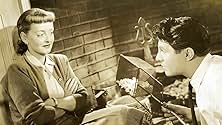IMDb-BEWERTUNG
6,2/10
1591
IHRE BEWERTUNG
Füge eine Handlung in deiner Sprache hinzuBette Davis is a successful poetess who falls in love with a war hero in this romantic melodrama that is a moving film experience any time of year.Bette Davis is a successful poetess who falls in love with a war hero in this romantic melodrama that is a moving film experience any time of year.Bette Davis is a successful poetess who falls in love with a war hero in this romantic melodrama that is a moving film experience any time of year.
- Regie
- Drehbuch
- Hauptbesetzung
Jim Davis
- Slick Novak
- (as James Davis)
Woody Herman
- Leader - Woody Herman and His Orchestra
- (as Woody Herman and His Orchestra)
Lois Austin
- Marcia
- (Nicht genannt)
Tex Brodus
- Restaurant Patron
- (Nicht genannt)
Gertrude Carr
- Woman on Subway
- (Nicht genannt)
Steve Carruthers
- Restaurant Patron
- (Nicht genannt)
Douglas Carter
- Waiter
- (Nicht genannt)
Hugh Charles
- Headwaiter
- (Nicht genannt)
Russ Clark
- Man in Cafe
- (Nicht genannt)
Franklyn Farnum
- Restaurant Patron
- (Nicht genannt)
Bess Flowers
- Restaurant Patron
- (Nicht genannt)
Charles Fogel
- Restaurant Patron
- (Nicht genannt)
Empfohlene Bewertungen
This is a much more than your typical Bette Davis melodrama. Here, Davis plays a NYC poetess (Susan Grieve), who runs around in high social circles. One of her society friends, Stacy Grant (John Hoyt), invites her to dine with him as he entertains a navel hero, Slick Novak (Jim Davis, Jock Ewing from TV's Dallas) who is staying briefly in town. Stacy's idea was to make Susan his date while pairing Novak up with his secretary, Peggy Markham (Janis Paige). However, the evening doesn't go as planned, since Novak falls for Susan rather than Peggy and invites himself into Susan's house after the evening's entertainment.
In spite of Susan and Novak not hitting it off too well at first, they start to talk. They soon discover--after driving to Susan's family farm in CT--that they each have unresolved issues from their past. Susan's problem has to do with her dead father; how her mother had treated him which lead him to commit suicide.
Susan never forgave her mother for her cheapness. However, Novak's insistence that Susan had not tried to see her mother's side of the issue leaves Susan to question her own beliefs.
Novak's unresolved issue is spiritual in nature. Since he had been 16, he had always felt a strong need to enter the priesthood and had been discouraged from this by talking to a priest before entering the Navy.
The two help each other to resolve these some of these issues. In the end, this is not so much of a romantic story between a man and a woman as it is a mutual guidance about leading each other to spiritual epiphanies (or sudden moments of soulful clarity) of how to proceed with their lives.
P.S. This is one of those movies in which the two leading co-stars stare the last name: Davis & Davis.
In spite of Susan and Novak not hitting it off too well at first, they start to talk. They soon discover--after driving to Susan's family farm in CT--that they each have unresolved issues from their past. Susan's problem has to do with her dead father; how her mother had treated him which lead him to commit suicide.
Susan never forgave her mother for her cheapness. However, Novak's insistence that Susan had not tried to see her mother's side of the issue leaves Susan to question her own beliefs.
Novak's unresolved issue is spiritual in nature. Since he had been 16, he had always felt a strong need to enter the priesthood and had been discouraged from this by talking to a priest before entering the Navy.
The two help each other to resolve these some of these issues. In the end, this is not so much of a romantic story between a man and a woman as it is a mutual guidance about leading each other to spiritual epiphanies (or sudden moments of soulful clarity) of how to proceed with their lives.
P.S. This is one of those movies in which the two leading co-stars stare the last name: Davis & Davis.
First off you get Betty Davis who can deliver films up like a chocolate treat. Then the story is one to ponder and takes its place in the genre as part of lifes big picture and our personal journeys along the way. Two people meet and instead of selfish pursuits of which some takes place, they discover the true purpose of the meet to begin with but only after they have lived through it all. This concept can apply to all of our wanderings and gives us a reason to pause and ponder while pursuing things and going from point A to point B. Nicely done talkative film and acted out to perfection this leaves you with afterglow for watching it. For those that like to eat while watching (I do), nice scene with bacon and pancakes with hot maple syrup and delicious coffee. Have yours ready and join in or choose your own delight and go for it. Listen to the dialog, watch the scenes and receive this...
Bette Davis stars as lonely NYC poetess Susan Grieve. Her best friend Stacy (John Hoyt) asks her to accompany him on a blind double date along with visiting war hero Slick Novak (Jim Davis) and Stacy's secretary Peggy (Janis Paige). The sparks are immediate between Susan and Slick, and they spend a snowy weekend together in the country where they both confront deep-seated issues.
Bette Davis is dependably good, but Jim Davis is one of the worst regularly-employed actors in Hollywood history. Watching him struggle through his lines is almost as painful as it is humorous. When his character finally reveals his "dark secret", it elicited a chuckle rather than a gasp, which I don't think was the intention. The film's high point is a surprisingly open performance by John Hoyt as the proverbial "gay best friend" from countless future romance films. Of course it's never explicitly stated that Hoyt's Stacy is gay, given this is still the production code era. It's not a mocking or condescending performance, either, which is doubly surprising for the time. Some of the dialogue between he and Davis has a pre-Code vibe, rich in double entendre. If only his character had been in service of a better story and movie.
Bette Davis is dependably good, but Jim Davis is one of the worst regularly-employed actors in Hollywood history. Watching him struggle through his lines is almost as painful as it is humorous. When his character finally reveals his "dark secret", it elicited a chuckle rather than a gasp, which I don't think was the intention. The film's high point is a surprisingly open performance by John Hoyt as the proverbial "gay best friend" from countless future romance films. Of course it's never explicitly stated that Hoyt's Stacy is gay, given this is still the production code era. It's not a mocking or condescending performance, either, which is doubly surprising for the time. Some of the dialogue between he and Davis has a pre-Code vibe, rich in double entendre. If only his character had been in service of a better story and movie.
"Winter Meeting" is a film that doesn't add anything to Bette Davis' distinguished career in the movies. The melodrama is undermined by a completely miscast Jim Davis, who makes the picture worse than it deserved to be. The part of Slick Novak should have gone to another actor that could have added a few more sparks to the movie.
As directed by Bretaigne Windust, "Winter Movie" is a dull attempt to bring the novel in which it's based to the screen. The adaptation leaves a lot to be desired.
The basic problem with the film is one of credibility. We don't believe, for one second, Slick Novak, the hero Navy lieutenant would even look at Susan Grieve at all, let alone be romantically involved with her. It's easy for us to understand why Susan would make a fool of herself in letting Slick come into her life. After all, plain Susan was no competition for gorgeous Peggy, who is all over Slick at the night club, and clearly wants him.
Stacy Grant, the man about town, kept reminding us of a subdued Waldo Lydecker, from "Laura", in the way he tries to get Susan under his influence. He wants to expose her to a society that she doesn't care to belong. This role was one of the ways Hollywood dealt with the subject of homosexuality in those days. Everyone knew about them, but the movie making people wanted to keep Stacy and his ilk in a permanent closet.
Bette Davis underplays Susan with mixed results. Obviously, Ms. Davis had no influence for getting out of this second class melodrama unworthy of her talent. Then again, one questions her wisdom in letting a light weight actor like Jim Davis play opposite her, when it's clear he is not in her league.
The wonderful John Hoyt makes the best out of Stacy Grant and Florence Bates, one of the best character actresses of that era, is fine as the housekeeper who knows a lot about the mistress of the house. Janis Paige, in all her beauty and youth, doesn't have much to do.
This is a film to be seen as a curiosity more than a Bette Davis signature vehicle.
As directed by Bretaigne Windust, "Winter Movie" is a dull attempt to bring the novel in which it's based to the screen. The adaptation leaves a lot to be desired.
The basic problem with the film is one of credibility. We don't believe, for one second, Slick Novak, the hero Navy lieutenant would even look at Susan Grieve at all, let alone be romantically involved with her. It's easy for us to understand why Susan would make a fool of herself in letting Slick come into her life. After all, plain Susan was no competition for gorgeous Peggy, who is all over Slick at the night club, and clearly wants him.
Stacy Grant, the man about town, kept reminding us of a subdued Waldo Lydecker, from "Laura", in the way he tries to get Susan under his influence. He wants to expose her to a society that she doesn't care to belong. This role was one of the ways Hollywood dealt with the subject of homosexuality in those days. Everyone knew about them, but the movie making people wanted to keep Stacy and his ilk in a permanent closet.
Bette Davis underplays Susan with mixed results. Obviously, Ms. Davis had no influence for getting out of this second class melodrama unworthy of her talent. Then again, one questions her wisdom in letting a light weight actor like Jim Davis play opposite her, when it's clear he is not in her league.
The wonderful John Hoyt makes the best out of Stacy Grant and Florence Bates, one of the best character actresses of that era, is fine as the housekeeper who knows a lot about the mistress of the house. Janis Paige, in all her beauty and youth, doesn't have much to do.
This is a film to be seen as a curiosity more than a Bette Davis signature vehicle.
The first thirty minutes may repel some.It's very talky ,it's filmed stage production style.This is a film which grows on you,you 've got to be patient for the "action" is minimal,and most amazing thing, in what is pure psychological drama ,there's not the easy way out : the flashbacks.Another director -it's the first film I've seen by Bretaigne Windust-would have at least enlivened things by introducing two very long flashbacks dealing with the two characters' past.Both have a secret to conceal .This is the very long conversation between them which reveals us that the poetess was demanding,idolizing her father,displaying no compassion for a mother who did not live up to her /their expectations;the soldier is a hero but someone told him something that has completely changed his way of seeing things .
People who expect a mushy romance ,a melodrama ,a love triangle (with the secretary) will be disappointed."Winter Meeting" shows the way to compassion for the others,be they hopeless.
People who expect a mushy romance ,a melodrama ,a love triangle (with the secretary) will be disappointed."Winter Meeting" shows the way to compassion for the others,be they hopeless.
Wusstest du schon
- WissenswertesThis film was a huge box office failure, bringing in less than half the cost of production and promotion. It was Bette Davis's biggest flop at Warner Bros. and came after Trügerische Leidenschaft (1946), another money-loser for the studio, causing Jack L. Warner to lose faith in Davis's box office appeal.
- PatzerWhen Stacey goes to Susan's apartment at the beginning of the film, he takes off a light-colored scarf. When he goes to leave, he puts on a much different and dark-colored scarf.
- Zitate
Stacy Grant: [to Peggy] Let me give you a piece of advice, culled from years of devestating experience. Next to loss of money, deafness, and skin disease, passion can be the most dangerous.
- VerbindungenFeatured in Salut für ...: Salut für Bette Davis (1977)
- SoundtracksIf I Could Be with You
(uncredited)
Music by James P. Johnson
Played when Susan and Stacey arrive at the restaurant
Top-Auswahl
Melde dich zum Bewerten an und greife auf die Watchlist für personalisierte Empfehlungen zu.
Details
- Erscheinungsdatum
- Herkunftsland
- Sprache
- Auch bekannt als
- Strange Meeting
- Drehorte
- Produktionsfirma
- Weitere beteiligte Unternehmen bei IMDbPro anzeigen
Box Office
- Budget
- 1.927.000 $ (geschätzt)
- Laufzeit
- 1 Std. 44 Min.(104 min)
- Farbe
- Seitenverhältnis
- 1.37 : 1
Zu dieser Seite beitragen
Bearbeitung vorschlagen oder fehlenden Inhalt hinzufügen


